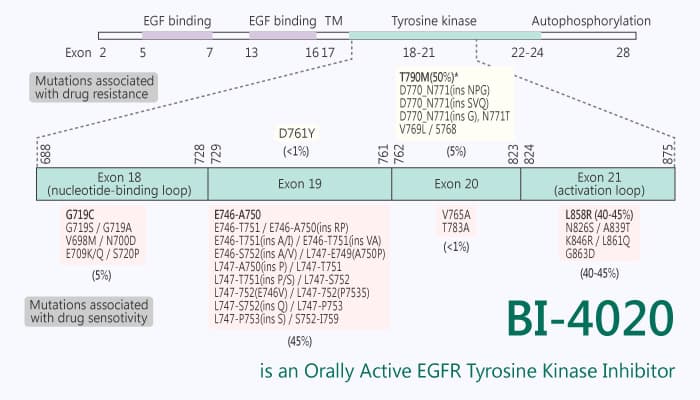The epidermal growth factor receptor (EGFR) is a receptor tyrosine kinase that transduces mitogenic signals. When EGFR carries an activating mutation, it can be an oncogenic driver in lung tumors.
Notably, Since additional mutation in the EGFR kinase domain that confers resistance to TKIs, lung cancer patients relapse within two years of therapy. For example, resistance mutations, T790M, and C797S, currently approved EGFR TKIs cannot inhibit their activities anymore.
As a result, the next generation of EGFR TKIs should be highly active against the most common EGFR activation mutation.
Today, we will introduce the 4th generation TKI, BI-4020.

In this text, we will precisely describe its activities in vitro and in vivo.
Firstly, in a SAR study, BI-4020 show a sub-nanomolar activity against EGFR del19 T790M C979S with an IC50 of 0.2 nM. Moreover, BI-4020 exhibits antiproliferative effects in a series of relevant EGFR mutant cell lines.The IC50 values are 0.6 nM, 1 nM, 190 nM, 1.3 nM and 200 nM for p-EGFR BaF3 (EGFRdel19TMCS*), BaF3 (EGFRdel19), BaF3 (EGFRwt), PC-9(EGFRdel19TMCS*)and A431 (EGFRwt)cells, respectively.
In order to test the EGFR effect of the macrocycle BI-4020 in-vivo. Researchers use a PC-9del19 T790M C797S xeno-transplants model.
BI-4020 (10mg/kg)and vehicle suppress EGFRdel19 T790M C797S phosphorylation 5-fold to 10-fold at 6 hours, 18 hours and 24 hours when comparing to the 6 h vehicle control. This result demonstrates that BI-4020 acrosses a 24 h period by oral administration.
Lastly, in the EGFRdel19 T790M C797S mutant human non-small cell lung cancer model. BI-4020 treatment starts the tumors displaying a size between 53 and 153 mm³. BI-4020 (10 mg/kg; 19 days) induces strong regressions in 10 out of 10 tumors. It leads to a TGI of 121 %. However, osimertinib (25 mg/kg) shows no effect of tumor growth with a TGI of 6 % in the same model.
In summary, in vitro, BI-4020 shows a single digit-nanomolar antiproliferative activity against EGFR mutant dependent cells, especially, cells bearing the two clinically prevalent resistance mutations T790M and C797S. Furthermore, in vivo, BI-4020 induces tumor regressions in the osimertinib resistant PC-9 (EGFRdel19 T790M C797S) mouse xenograft model.
BI-4020 is a fourth-generation, orally active, and non-covalent EGFR tyrosine kinase inhibitor. It is a promising compound that will be active in a clinical setting and has the potential for lung cancer treatment.
reference:
Engelhardt H, et al.J Med Chem. 2019 Nov 27;62(22):10272-10293.